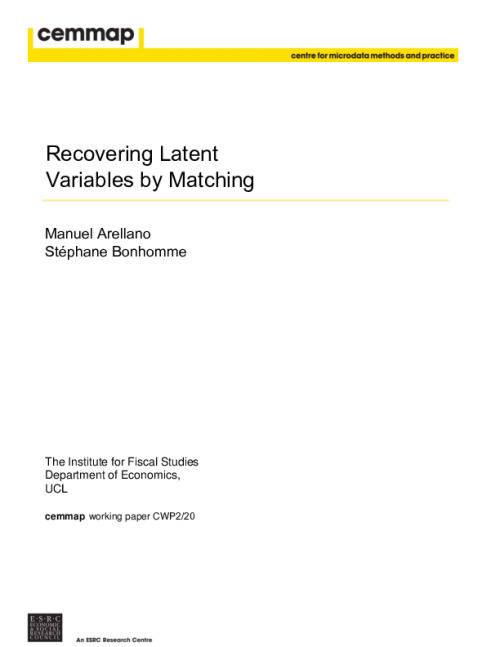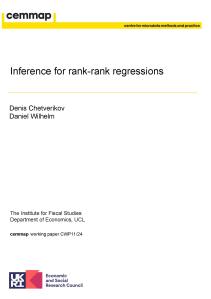Downloads

CW0219-Recovering-Latent-Variables-by-Matching.pdf
PDF | 1.45 MB
We propose an optimal-transport-based matching method to nonparametrically estimate linear models with independent latent variables. The method consists in generating pseudo-observations from the latent variables, so that the Euclidean distance between the model’s predictions and their matched counterparts in the data is minimized. We show that our nonparametric estimator is consistent, and we document that it performs well in simulated data. We apply this method to study the cyclicality of permanent and transitory income shocks in the Panel Study of Income Dynamics. We find that the dispersion of income shocks is approximately acyclical, whereas the skewness of permanent shocks is procyclical. By comparison, we find that the dispersion and skewness of shocks to hourly wages vary little with the business cycle.
Authors

Research Fellow Centre for Monetary and Financial Studies (CEMFI)
Manuel is a Research Fellow of the IFS and a Professor of Econometrics at CEMFI, Madrid.

Professor of Economics University of Chicago
Working Paper details
- DOI
- 10.1920/wp.cem.2020.220
- Publisher
- The IFS
Suggested citation
Arellano, M and Bonhomme, S. (2020). Recovering Latent Variables by Matching. London: The IFS. Available at: https://ifs.org.uk/publications/recovering-latent-variables-matching (accessed: 30 June 2024).
More from IFS
Understand this issue

Gender norms, violence and adolescent girls’ trajectories: Evidence from India
24 October 2022

What are the challenges in getting debt on a falling path?
28 June 2024

Election Special: Your questions answered
27 June 2024
Policy analysis

IFS Deputy Director Carl Emmerson appointed to the UK Statistics Authority Methodological Assurance Review Panel
14 April 2023

ABC of SV: Limited Information Likelihood Inference in Stochastic Volatility Jump-Diffusion Models
We develop novel methods for estimation and filtering of continuous-time models with stochastic volatility and jumps using so-called Approximate Bayesian Compu- tation which build likelihoods based on limited information.
12 August 2014

Is there really an NHS productivity crisis?
17 November 2023
Academic research

Inference for rank-rank regressions
28 May 2024

Sample composition and representativeness on Understanding Society
2 February 2024

The impact of labour demand shocks when occupational labour supplies are heterogeneous
28 June 2024